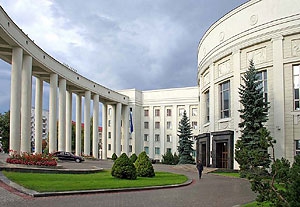Ru
|
Eng
Belarus, Cuba intend to cooperate in instrument-making, nano-and information technologies
17.11.2015

The Academies of Sciences of Belarus and Cuba intend to develop cooperation in the field of instrument-making, nano-and information technologies, BelTA learned from the press service of the National Academy of Sciences of Belarus (NASB).
"A delegation of the Cuban Academy of Sciences led by Fidel Castro Diaz-Balart, scientific adviser of the State Council of the Republic of Cuba and vice president of the Academy of Sciences of Cuba, visited the NASB on 17 November. During the talks, Fidel Castro Diaz-Balart expressed interest in expanding cooperation between Cuban and Belarusian scientists in the field of scientific instrument-making, nano-and information technologies, and also in the use of the services of the Belarusian space system for the Earth remote sensing,” said the press service.
The NASB stressed that Belarus is ready to actively develop joint work with Cuban researchers in the field of bio- and pharmaceutical technologies. "At present, the scientists of the Institute of Bioorganic Chemistry at the NASB are collaborating with colleagues from the Center of Molecular Immunology of the Republic of Cuba to create modern drugs based on monoclonal antibodies. These are high-tech bio-pharmaceutical medicines," the academy said.
The NASB intends to send the list of proposals on joint projects to the Cuban side soon. Chairman of the NASB Presidium Vladimir Gusakov suggested signing a tripartite agreement on cooperation between the National Academy of Sciences of Belarus, the Cuban Academy of Sciences and the Ministry of Science and Technology of Cuba.
Attending the talks were also Ambassador Extraordinary and Plenipotentiary of Cuba to Belarus Gerardo Suarez Alvarez, and the heads of the scientific organizations of the National Academy of Sciences of Belarus. The guests visited the Museum of History of the National Academy of Sciences of Belarus, a permanent exhibition of domestic science achievements and the United Institute of Informatics Problems at the National Academy of Sciences of Belarus.
"A delegation of the Cuban Academy of Sciences led by Fidel Castro Diaz-Balart, scientific adviser of the State Council of the Republic of Cuba and vice president of the Academy of Sciences of Cuba, visited the NASB on 17 November. During the talks, Fidel Castro Diaz-Balart expressed interest in expanding cooperation between Cuban and Belarusian scientists in the field of scientific instrument-making, nano-and information technologies, and also in the use of the services of the Belarusian space system for the Earth remote sensing,” said the press service.
The NASB stressed that Belarus is ready to actively develop joint work with Cuban researchers in the field of bio- and pharmaceutical technologies. "At present, the scientists of the Institute of Bioorganic Chemistry at the NASB are collaborating with colleagues from the Center of Molecular Immunology of the Republic of Cuba to create modern drugs based on monoclonal antibodies. These are high-tech bio-pharmaceutical medicines," the academy said.
The NASB intends to send the list of proposals on joint projects to the Cuban side soon. Chairman of the NASB Presidium Vladimir Gusakov suggested signing a tripartite agreement on cooperation between the National Academy of Sciences of Belarus, the Cuban Academy of Sciences and the Ministry of Science and Technology of Cuba.
Attending the talks were also Ambassador Extraordinary and Plenipotentiary of Cuba to Belarus Gerardo Suarez Alvarez, and the heads of the scientific organizations of the National Academy of Sciences of Belarus. The guests visited the Museum of History of the National Academy of Sciences of Belarus, a permanent exhibition of domestic science achievements and the United Institute of Informatics Problems at the National Academy of Sciences of Belarus.
SCIENCE. TECHNOLOGY. INNOVATIONS
13.08.2024
28.06.2024
28.06.2024
25.06.2024
05.06.2024
15.05.2024
15.05.2024
26.04.2024
26.04.2024
26.04.2024













